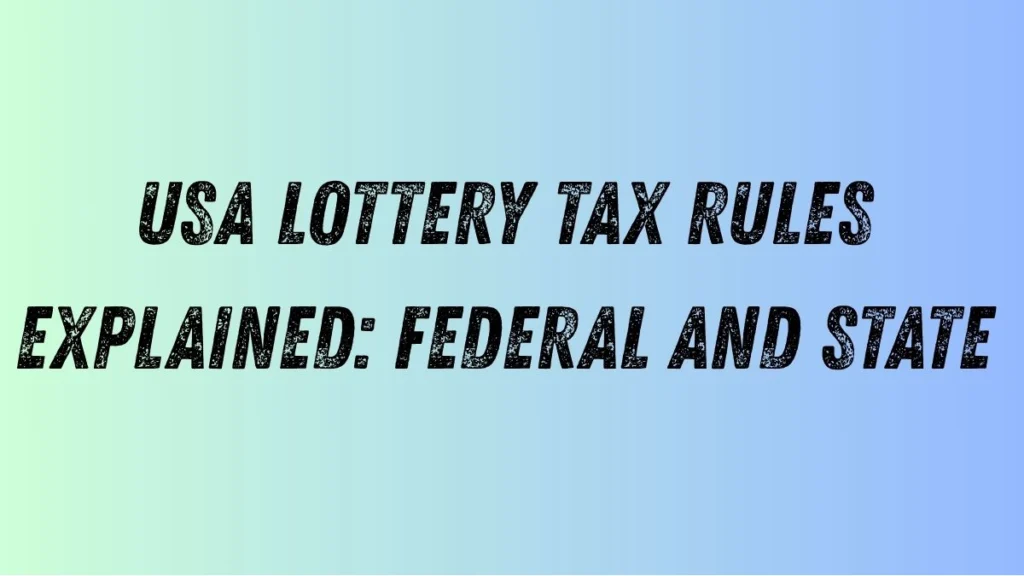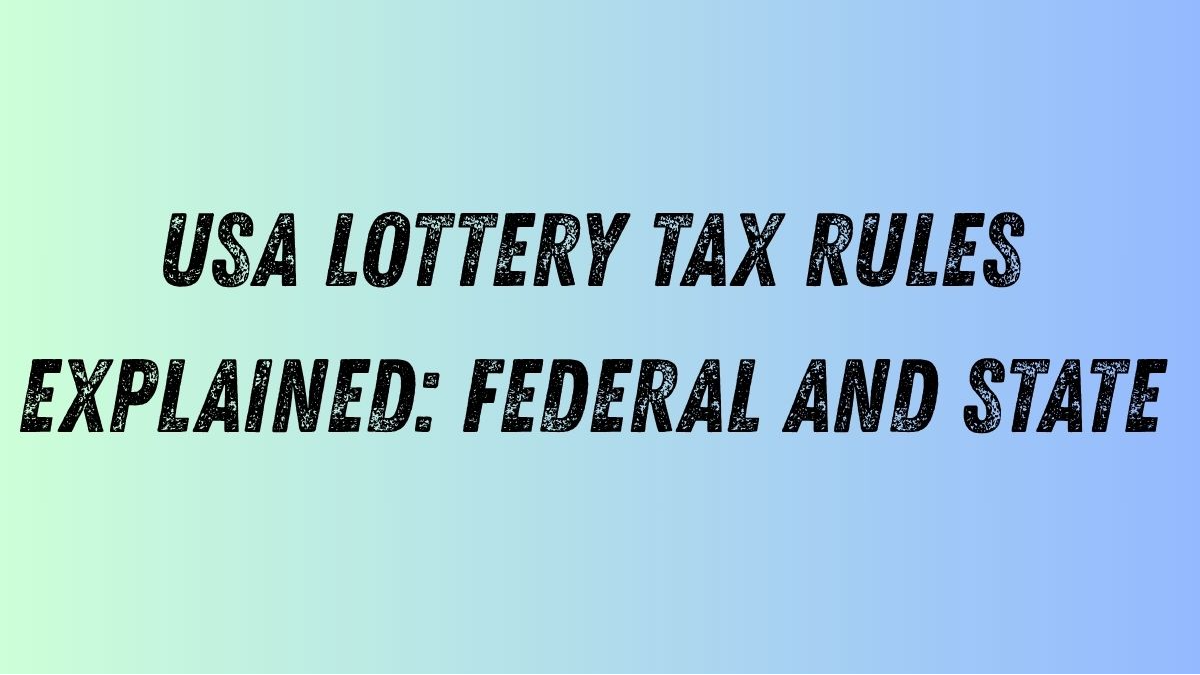
Winning the lottery can be life-changing. Whether it’s Powerball, Mega Millions, or a state lottery like the Florida lottery or NY lottery, every winner needs to understand one very important thing — taxes. If you win a big prize, you won’t take home the full amount. The U.S. government and your state may take a share.
This article explains in simple words how USA lottery tax rules work at both the federal and state levels. We’ll also include examples using well-known lotteries like the Michigan lottery, PA lottery, NJ lottery, and more.
What Taxes Do You Pay on Lottery Winnings in the USA?
When you win a lottery prize in the USA — no matter which lottery — you must pay federal income tax. You may also need to pay state income tax, depending on where you bought the ticket.
Federal Tax on Lottery Winnings
The IRS treats lottery winnings as income, so they are taxed like a paycheck or bonus.
- Federal withholding rate: 24% is automatically taken out if you win more than $5,000.
- Actual tax rate: If your total income is high, the IRS may tax you up to 37%.
This applies whether you play the Mega Millions, Powerball, or a state game like the Ohio lottery or Virginia lottery.
Example:
If you win $1 million in the New York lottery, the IRS will withhold $240,000. But when you file your taxes, you may owe more depending on your total income.
State Taxes on Lottery Winnings
In addition to federal tax, many U.S. states also take state income tax on lottery winnings. Each state has its own rules. Some take nothing at all, while others take more than 8%.
Let’s break it down by state:
States with No State Tax on Lottery Winnings
Florida lottery
- No state income tax
- You only pay the federal tax
- Great state for big jackpot wins like Mega Millions jackpot lottery numbers
Texas lottery
- Also has no state tax
- Winner keeps more of their prize
South Dakota, Washington, Wyoming, New Hampshire
- Not in our main list, but also have no state lottery tax
States with State Tax on Lottery Winnings
New York lottery / NY lottery
- State tax: Up to 8.82%
- Also has city tax in NYC
- One of the highest-taxed states for winners
NJ lottery / New Jersey lottery
- State tax: 5%
- Applies to prizes over $10,000
PA lottery / Pennsylvania
- State tax: 3.07%
- Fairly low tax rate
CT lottery / Connecticut
- State tax: Around 6.99%
- Applies to all lottery winnings over $5,000
Mass lottery / Massachusetts
- State tax: 5%
- Applies to winnings over $600
Virginia lottery / VA lottery
- State tax: 5.75%
- Taxed like other income
Georgia lottery / GA lottery
- State tax: 5.75%
- Applies to prizes over $5,000
North Carolina lottery / NC lottery
- State tax: 4.75%
- Good for players seeking moderate rates
Ohio lottery
- State tax: 4%
- One of the lower rates, but still taxable
Illinois lottery
- State tax: 4.95%
- Applied to all winnings
Michigan lottery
- State tax: 4.25%
- Easy process for prize claims
South Carolina lottery / SC lottery
- State tax: 7%
- One of the higher state taxes
How Much Do You Really Get After Taxes?
Let’s look at a simplified example using the Mega Millions:
Mega Millions jackpot: $100 million (lump sum cash option)
- Federal withholding (24%): $24 million
- State tax (depending on state):
- Florida lottery: $0
- NY lottery: $8.82 million
- NJ lottery: $5 million
- PA lottery: $3.07 million
- Georgia lottery: $5.75 million
Total Take-Home (Approximate):
- Florida: $76 million
- New York: $67.18 million
- New Jersey: $71 million
- Pennsylvania: $72.93 million
- Georgia: $70.25 million
The state you play in makes a big difference.
Lump Sum or Annuity — What’s Better for Taxes?
Lottery winners can choose between:
- Lump sum: One large payment now
- Annuity: Payments over 29 years
Tax Tip:
- Lump sum gets taxed all at once, possibly at the highest rate
- Annuity spreads the tax over time, which may lower your overall tax bill
Talk to a tax advisor before deciding.
Foreigners and USA Lottery Taxes
If you’re not a U.S. citizen, you can still play and win in the USA. However, tax rules are slightly different:
- Federal tax: 30% is withheld for non-residents
- State tax: Varies, same as for citizens
Some countries have tax treaties with the U.S. to lower or avoid double taxation. Check with your country’s tax office.
Where to Check Taxes by State?
Each state has an official lottery website where tax information is clearly listed. For example:
- Florida lottery official site
- NY lottery official site
- NJ lottery official site
- Michigan lottery
- PA lottery
- VA lottery
- Georgia lottery
Use these to check rules before you play.
- Important Tips for Lottery Winners
- Sign your ticket as soon as you buy it
- Take a picture for proof
- Talk to a financial planner or lawyer
- Keep your win private, if your state allows it
Pay your taxes on time to avoid penalties
Winning the lottery is exciting, but it comes with big tax responsibilities. Whether you play the Powerball, Mega Millions, or a local draw like the Ohio lottery, understanding federal and state tax rules helps you plan ahead.
Some states like Florida, Texas, and Washington offer tax-free lottery winnings, while others like New York and New Jersey take a big bite. Always know the rules before you play, and make smart choices after you win.
